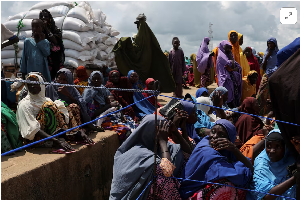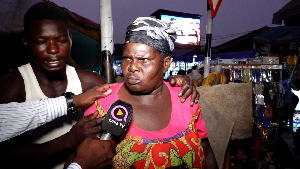2009 IMF/WORLD BANK SPRING MEETINGS APRIL 21-27, 2009
SUMMARY OF ISSUES DISCUSSED
Background
The Boards of Governors of the International Monetary Fund (IMF) and the World Bank meet twice a year in (April) for the spring and in (September or October) for the Annual meetings, to deliberate on issues affecting the functions and operations of the institutions. This year’s Spring Meetings took place in April 21-27, 2009 within the context of the global financial and economic crisis.
Ghana’s Delegation
Ghana’s delegation was led by the Minister of Finance and Economic Planning, Hon. Dr. Kwabena Duffuor. The delegation was made up of officials from the Ministry of Finance and Economic Planning, the Governor of the Bank of Ghana and officials from the Bank of Ghana.
Other Side Meetings
Apart from the main Spring Meetings of the Board of Governors of the IMF and the World Bank, the delegation had other meetings with staff of the IMF and the World Bank on Ghana’s relations with the institutions and their support for addressing Ghana’s macroeconomic imbalance. There were several other bilateral meetings with various institutions and individuals including the US Treasury Department and the Millennium Challenge Corporation (MCC).
The Minister also attended the 15th Commonwealth Ministerial Debt Sustainability Forum (CMDSF) which preceded the Spring Meetings.
IMF Meetings
The delegation met with the Executive Director of Ghana at the IMF, the Director of the African Department and the Deputy Director of the Fiscal Affairs Department of the IMF.
The delegation discussed the IMF’s financial support to Ghana with a possible precautionary standby arrangement of not less than US$1 billion to support Ghana’s foreign exchange reserves.
The delegation was informed that following the G-20 meeting in March 2009, agreement was reached to increase the SDR allocation by the IMF to all member countries. This allocation for Ghana is estimated at SDR 283 million (US$420 million at current exchange rates), and is expected to become available in the third quarter of 2009. In addition to this amount, the Fund has agreed to assess the balance of payments need, and to support the government’s macroeconomic adjustment programme (including for the estimated balance of payments gap). Preliminary indications are that the Fund’s support could be in the order of around US$600 million over a two- to three-year period, which together with the additional SDR allocation, would boost Ghana’s gross foreign exchange reserves by around US$1 billion.
The program funding level would need to be endorsed by IMF management, based on the results of the program mission. We discussed program options, which are essentially the stand-by arrangement or Poverty Reduction and Growth Facility (PRGF). The main advantage of the latter is its concessional funding, which would be at a fixed 0.5 percent interest rate repayable over 10 years, as opposed to a market-based interest rate on the stand-by (currently 1.5 percent, but potentially higher), and with a much shorter repayment period (less than 5 years).
Discussions were also held on technical assistance support from the IMF’s Fiscal Affairs and the Money and Capital Markets Departments. These were mainly on revenue policy, revenue management, natural resource management and financial sector reforms.
Ghana indicated its willingness to host the Headquarters of the African Technical Assistance Centre (AFRITAC) West 2 to deal with capacity building and technical assistance within the West African (English speaking) sub-region.
The delegation had meetings with the African Department of the IMF to discuss Article IV (multilateral surveillance) consultations on the macroeconomic situation in Ghana. This is a standard mandatory Mission that all member countries of the IMF are subjected to, at least once every year. The mission has been tentatively scheduled for May 11 – 22, 2009.
World Bank Meetings
The delegation met with the World Bank’s Managing Director and the Regional Vice President, both responsible for Africa, the International Finance Corporation Vice President and the Country Teams for Ghana.
The Bank management reiterated that US$1.2 billion has been allocated to Ghana for Budget/Sector Support Programmes and Projects for the ensuing three-year period. Of this amount US$450 million had been earmarked for budget support. (Prior to the trip to Washington the World Bank Country Director in Ghana had informed the Minister that an additional amount of USS$75 million has recently been allocated to Ghana. The Minister had asked for this amount to be added to the Budget Support Programme thus increasing the amount to US$525 million for the three-year period).
Under the World Bank’s Budget Support Facility – Poverty Reduction Support Credit Seven (PRSC7) – there were intensive discussions, to frontload US$375 million out of a tentative allocation to Ghana of US$525 million over three years.
Other matters discussed included support for the Natural Resource and Environmental Governance (NREG) and Extractive Industries and Transparency Initiative (EITI), and sector budget support for the Agricultural Development Policy Lending. The transport sector will receive a financial support of US$220 and another US$200 million is being tentatively earmarked for intervention in the areas of water and sanitation.
Officials of the Ghana National Petroleum Corporation (GNPC) in positioning the Company to manage gas resources that will be a by-product with the production of oil joined the discussions with the World Bank and the International Finance Corporation (IFC) to negotiate financing for the gas infrastructure in Ghana. The amount being sought to develop the gas infrastructure is about US$500 million.
The Commonwealth Ministerial Debt Sustainability Forum
The Commonwealth Ministerial Debt Sustainability Forum held its 15th meeting in Washington DC on 22nd April 2009. Finance Ministers and their representatives from Cameroon, The Gambia, Ghana, Guyana, Lesotho, Malawi, Mozambique, Nigeria, and Sierra Leone, Tanzania, Uganda and Zambia participated.
The Forum discussed the implications of the economic and financial crisis for low income and debt vulnerable countries. The Forum welcomed increases in concessional assistance to support low income countries in spite of the current pressures on donor country budgets. Ministers requested for such type of assistance for both quality and quantity of development assistance. They welcomed the commitments made by G-20 leaders in London ($50 billion pledge to support Low Income Countries (LICs) and options to mobilise significant additional resources from International Financial Institutions (IFIs) to meet countries’ needs.
They also requested for greater flexibility in the application by the IFIs of the non-concessional borrowing policy and the debt sustainability framework, and the need to increase the use of non-concessional lending to support, especially, the infrastructure sector.
Ministers agreed on the need for major efforts to strengthen debt strategy formulation and execution to be complimented by efforts to strengthen legal, institutional and organisational frameworks for debt management.
Meeting on the re-location of the Afri Exim Bank
The meeting was attended by member countries from Ghana, Nigeria, Kenya, the President and staff of the Bank, and was chaired by the Finance Minister for Uganda.
The main purpose of the meeting was to reach consensus on the location of the headquarters of the Afri Exim Bank based on an earlier decision to re-locate the Bank from its current headquarters in Egypt. A consultant’s report had recommended that the headquarters be hosted by Ghana.
However, Nigeria and Kenya, who are eager to also host the headquarters of the Bank, are for various reasons, contesting the report of the consultants. Ghana reiterated its position to host and urged all members to abide by the rules earlier established.
It was proposed that since Nigeria is currently hosting the regional office in West Africa, the other regional office for East Africa should be hosted by Kenya, while Ghana hosts the Headquarters.
The final decision is likely to be taken during the African Development Bank Annual Meetings to be held in Dakar, Senegal in May, 2009.
Business News of Friday, 8 May 2009
Source: --
IMF/World Bank Spring Meeting
Entertainment











